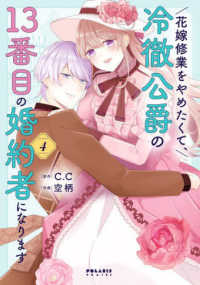- ホーム
- > 洋書
- > 英文書
- > Cinema / Film
Full Description
Forever Girls explores girlhood manifest in contemporary South Korean cinema within the conflicting socio-political forces that shaped the nation: coloniality, postcolonial and postwar traumas, modernity, and democracy. Author Jinhee Choi reorients the direction of current scholarship on contemporary South Korean cinema from patriarchy, masculinity and violence, to instead consider girls as a social imaginary.
Drawing on the depiction of girlhood from the 1970s as a reference image, including that of low-wage working-class girls, Choi explores the extent to which the form of girlhood represented in the millennial South Korean cinema still resonates with such an image. From the popular teen pictures and male auteurs' work of the 1970s; to a contemporary film cycle on military sexual slavery ("wianbu"); to Bong Joon-ho's girl trilogy; and to South Korean independent cinema of 2010s directed by women, Choi focuses on girls' sexuality, labor, and leisure, and demonstrates how girls in contemporary South Korean cinema are increasingly represented to have agency (albeit still limited); they are subjects who remember the past, experience the present, and envision the future, and whose interiority lies beyond their status as victims of sexual violence and national trauma. Choi further critically engages with the girlhood associated with unproductivity and dismissed as mere irreality. In contrast, she foregrounds how cinema could adequately mourn girls' deaths and grant them shelter and idleness as part of what is desperately needed: the very girlhood that has long been denied.
Contents
Introduction
Chapter 1: Reference Girls: The 1970s
Chapter 2: Girls that Disappear, Girls that Remember: From the Writing to Speaking Subject
Chapter 3: Death of a Girl: Necro-cinematics and Bong Joon Ho's Girl Trilogy
Chapter 4: Directing Girls: Korean Indie Women Directors and Girlhood
Chapter Five: Idle Girls: Sunny (2011), Miss Granny (2014), and Queen of Walking (2015)
Afterword








